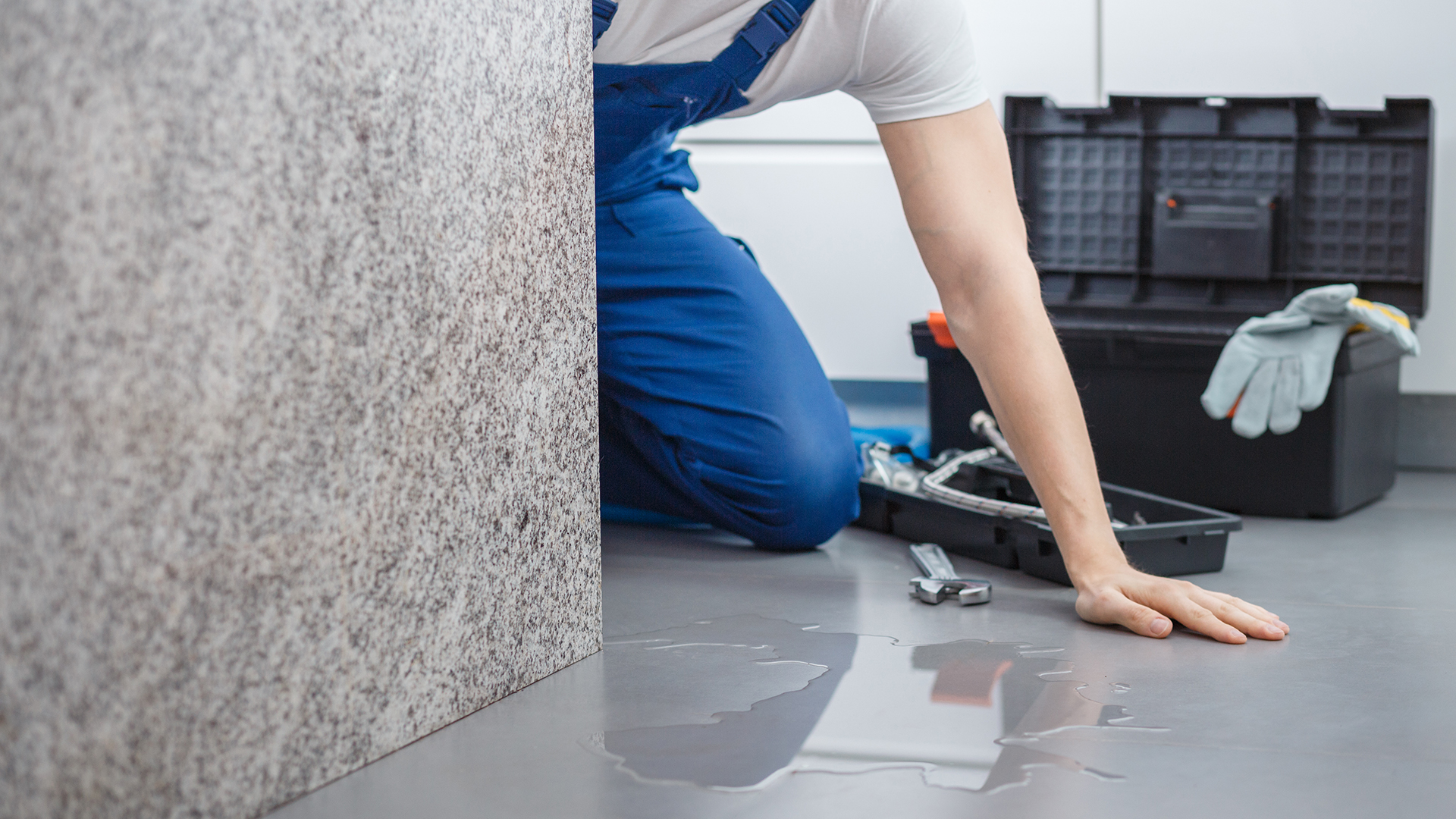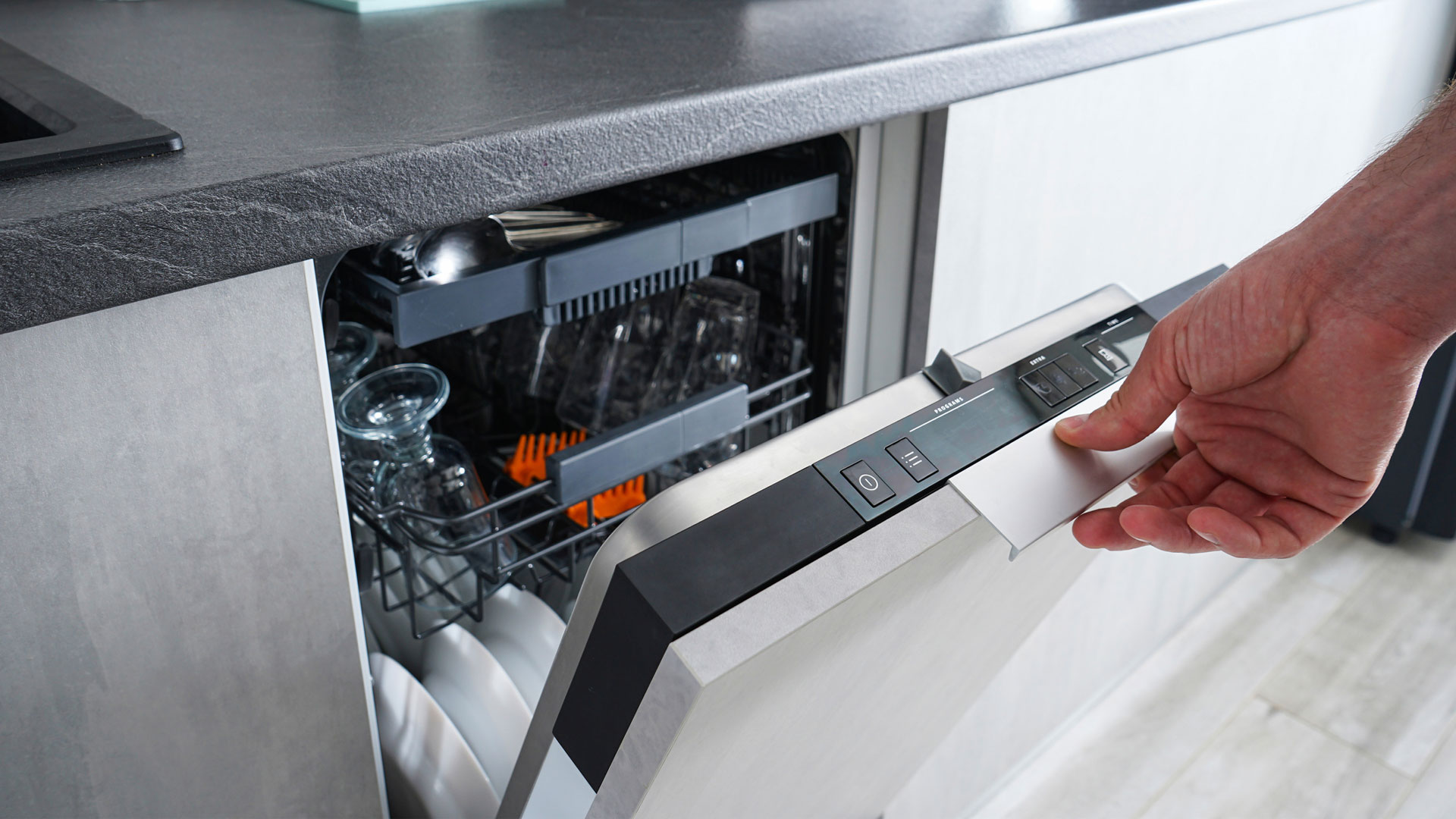Why is my dishwasher leaking?
This could be the reason

Sign up to receive the latest news, reviews, buying guides and deals direct to your inbox
You are now subscribed
Your newsletter sign-up was successful
Discovering that your dishwasher is leaking can ruin anyone's day. The best dishwashers are the backbone of any modern-day kitchen. They take your plates from grimy to glistening, and they do so without you getting your hands dirty. So, what do you do when you have a leaking dishwasher?
When it comes to remedying the situation and cleaning up the water, the first port of call is to identify where the leak is coming from. You can do so by visually inspecting your appliance. And the second? Do so promptly. As Lindsay Jones, New Product Brand Manager at Maytag, says: "Dishwasher leaks should be quickly diagnosed and repaired. If left untreated, a leaky dishwasher can cause even bigger issues than a puddle in your kitchen!".
But before you rush to call in a professional, you can stop your dishwasher from leaking. To learn everything you need to know about when you have a leaking dishwasher, check out Lindsay's top tips.
What to do when you have a leaking dishwasher
1. Double check you have used the correct detergent
Lindsay says: “Dishwashers should only be loaded with detergent that is specified for automatic dishwashers. Regular dish soap that you use to hand wash your dishes creates too many suds that will not only overflow the tub and may leak onto the floor but will also erode the inside of your dishwasher. As tempting as this may be, do not use dish soap in your dishwasher.”
2. Look whether you have loaded your dishwasher properly
Yes, dishwashers work quickly to wash your dishes. But it is very important to not rush to load your dishwasher or overload it. Lindsay explains: “In order for your dishwasher to run properly, it’s important to load dishes correctly. An overloaded dishwasher or an improperly loaded dishwasher can use too much water, and the added pressure can push up against the door and cause, you guessed it…leaks!”.
Sign up to receive the latest news, reviews, buying guides and deals direct to your inbox

3. Check for signs of aging
One of the main reasons why your dishwasher might be leaking? Age. “Depending on the age of your dishwasher, it may be time to replace the door seal,” Lindsay says. “Look to see if the seal is making full contact with the dishwasher. It’s also important to check for signs of erosion on the bottom of your dishwasher. Your dishwasher, like all appliances, will go through wear and tear, so it’s important to catch these signs sooner rather than later.”
What causes dishwasher leaks?
According to Lindsay, there are five possible reasons why your dishwasher might be leaking. This includes:
1. A leak line in your water supply
To find out if this is the root cause, Lindsay suggests: “Checking the water line from your household water supply to see if it is damaged or cracked. Remember to always disconnect electrical power or turn off the breaker before any inspections or repairs.”
2. A clogged filter
“It is normal for there to be a small amount of standing water in the dishwasher filter area,” Lindsay says. “But if you find more than an inch during your inspection, it may be clogged. Clogging can lead to improper draining that may cause the water level to rise too high, resulting in it leaking out when overfull.”
3. Drain Line Issues
Lindsay explains: “If the drain link is not installed correctly or clogged, residual water will remain in the bottom of the tub and can cause your dishwasher to leak. Unfortunately, if the drain line appears to be installed correctly and standing water is still occurring at the bottom of the tub, then the dishwasher may be clogged, or you may have a broken drain motor.”
Just note: if that’s the case, then these are more complex issues that will need to be inspected by a service technician.
4. An un-leveled Unit
This one’s an easy problem to fix. Lindsay says: “Making sure that your dishwasher is fully leveled is important to ensure proper performance and to prevent water from collecting under it (which could cause leaking). If the dishwasher is not level, adjusting the front legs up or down until it is square in the cabinet and flat on the floor will allow it to be evenly supported by the leveling legs and rear wheels.”
5. A damaged door latch or gasket
Another reason why your dishwasher may be leaking? It could be that your door is damaged.
Lindsay tells us: “Checking the door latch to see if it’s loose or bent is also important when inspecting a leaking dishwasher. If either occurs, your dishwasher will not close completely and may cause leakage around the door during cycles. You may be able to tighten the latch with a screwdriver if it’s simply loose. Another possible cause of a leaky door is a loose, cracked, or damaged gasket (this works to seal the door and keep water from escaping). If it’s loose, it can typically be secured back in place, but if it’s damaged, you will need to replace it.”
Can anyone install their own dishwasher?
Installing a dishwasher doesn’t need to be handled by professionals. As long as you have the appropriate plumbing and electrical, it’s a task you can tackle on your own.
However, as Lindsay notes: “A crucial point to keep in mind is to make sure to use the written dishwasher installation instructions that came with your dishwasher. If you are unsure of the installation process, contact a professional to help get your dishwasher up and running.”
Becks is a freelance lifestyle writer who has worked extensively for Top Ten Reviews during the past year. She started her career in print journalism at a local newspaper and has since then worked across digital and social media for food titles and home interior magazines. When she’s not writing, she’s reading and when she’s not reading, she’s writing.
